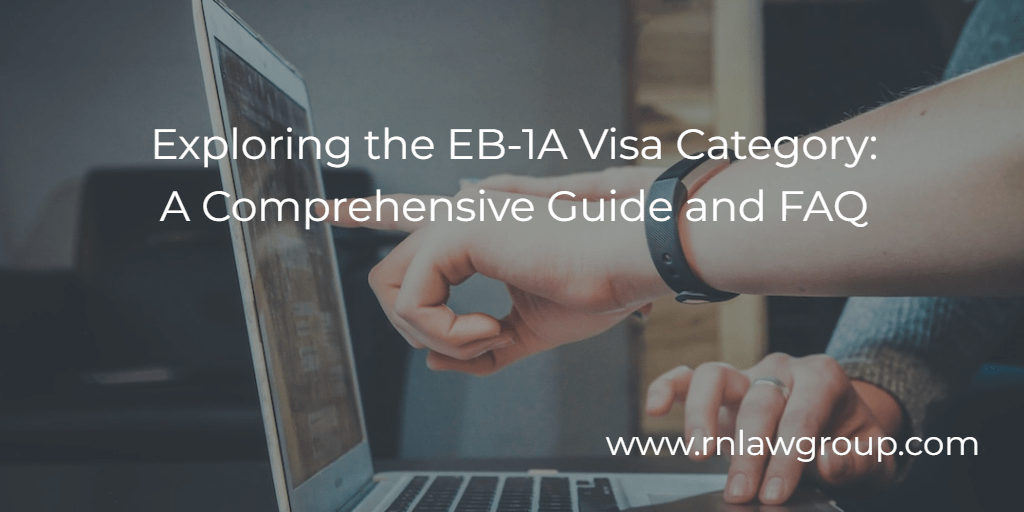
Exploring the EB-1A Visa Category: A Comprehensive Guide and FAQ
The EB-1A visa is a type of employment-based visa. People with exceptional talent in the arts, sciences, business, education, or athletics are eligible for the employment-based EB-1A visa.
To be eligible for an EB-1A visa, an individual must demonstrate extraordinary ability in their field through sustained national or international acclaim. This can be demonstrated through meeting at least three of the following criteria:
- Receipt of a major internationally recognized award
- Membership in a professional association that requires outstanding achievement
- Published material about the individual in professional or major trade publications or other major media outlets
- Participation as a judge of the work of others in the same or a similar field
- Original scientific, scholarly, artistic, athletic, or business-related contributions of major significance to the field
- Authorship of scholarly articles in professional journals or other major media outlets
- Evidence of performance in a leading or critical role in distinguished organizations
- Evidence that you command a high salary or other significantly high remuneration in relation to others in the field
- Evidence that your work has been displayed at artistic exhibitions or showcases
- Evidence of your commercial successes in the performing arts
It’s crucial to remember that fulfilling these requirements by itself does not ensure that an EB-1A visa will be approved. The nature of the person’s profession, how it affects their industry, and any possible advantages of having them in the country are all things that USCIS will take into account.
An individual must submit a petition to USCIS in order to apply for an EB-1A visa. Evidence of the person’s outstanding talent and proof that their presence in the US will advance the interests of the nation should both be included in the petition. This can consist of letters of support from authorities in the field, proof of press coverage, and documentation of previous or ongoing employment in the United States.
The processing time for an EB-1A visa can vary depending on the workload of USCIS and other factors. Generally, if one applies for premium processing it will take 10-15 days to get a decision on their EB-1A petition.
If a person’s application for an EB-1A visa is granted, they might be qualified to submit a request for a green card through consular processing or status adjustment (Form I-485). They may be granted permanent residency as a result, allowing them to remain in the country permanently and live and work there.
The EB-1A visa holder’s family members may also be qualified to apply for derivative visas to follow or join them in the United States. This can include the person’s spouse and any children under the age of 21 who are not married.
It’s important to note that an EB-1A visa is not a guarantee of permanent residence in the United States. The individual must continue to meet the criteria for the visa category and comply with U.S. immigration laws in order to maintain their visa status.
Here are some frequently asked questions about the EB-1A visa category:
Q: Can I apply for a green card with an EB-1A visa?
A: Yes, an EB-1A visa is an employment-based visa that can lead to a green card. If you are approved for an EB-1A visa, you may be eligible to apply for a green card through adjustment of status or consular processing. Please keep in mind that the visa bulletin is always subject to change. Currently as of the April 2023 bulletin, for countries of changeability, there is a backlog for EB-1A meaning individuals with a priority date after June 1, 2022 will not be eligible to immediately file for the green card. it originally said July 1, 2022 but the correct date is June 1, 2022
Q: What are the requirements for demonstrating extraordinary ability?
A: The individual must meet at least 3 of the 10 listed criteria. However, there are 2 other determinations that USCIS makes when reviewing EB-1A petitions. First, it reviews whether the Applicant’s work will provide a Substantial Benefit to the U.S. Next, it evaluates the minimum 3 out of 10 criteria. Lastly, USCIS will make a Final Merits determination. In this Final Merits Determination, USCIS analyzes an individual’s accomplishments and weighs the totality of the evidence to determine if their successes are sufficient to demonstrate that they have extraordinary ability in the field of endeavor.
Q: How do I apply for an EB-1A visa?
A: To apply for an EB-1A visa, you must file a petition with USCIS. The petition should include evidence of your extraordinary ability, as well as evidence that your presence in the United States will benefit the country.
Q: How long does it take to get an EB-1A visa?
A: The processing time for an EB-1A visa can vary depending on the workload of USCIS and other factors. Generally, when applied in premium it takes 10-15 days to receive a decision. If applying in regular processing it can take several months to a year to receive a decision. Also keep in mind that depending on the level of evidence required it may also take 1 month to 4 months to prepare the petition to send to USCIS.
Q: Can I include family members in my EB-1A petition?
A: Yes, you can include your spouse and unmarried children under the age of 21 in your EB-1A petition. They can apply for derivative visas to accompany or follow-to-join you in the United States.
Q: Can I change employers on an EB-1A visa?
A: Yes, you can change employers on an EB-1A visa as long as the new employment is in the same or a similar field as the work that qualified you for the visa. However, you will need to file a new petition with USCIS if you change employers. If filed as a self-petition, there is no need to file a new EB-1A petition.
Q: Can I apply for a green card with an EB-1A visa?
A: Yes, an EB-1A visa is an employment-based visa that can lead to a green card. If you are approved for an EB-1A visa, you may be eligible to apply for a green card through adjustment of status or consular processing. Please keep in mind that the visa bulletin is always subject to change. Currently as of the April 2023 bulletin, for countries of chargeability, there is a backlog for EB-1A meaning individuals with a priority date after July 1, 2022 will not be eligible to immediately file for the green card.
If you believe that you may qualify for the EB-1A visa category you should schedule an evaluation with an experienced immigration attorney!
Reddy & Neumann has been serving the business community for over 20 years and is Houston’s largest immigration law firm focused solely on US. Employment-based immigration. We work with both employers and their employees, helping them navigate the immigration process quickly and cost-effectively.
Juanita Deaver is an Associate Attorney in the I-140 and AOS Department, where she assists clients in the middle and later stages of the green card process.
Juanita earned her J.D. from South Texas College of Law Houston in May 2021. As a law-student, Juanita interned at a non-profit organization where she discovered her passion for immigration while working on family-based cases helping file I-130 petitions and I-485 adjustments of status. During her time at South Texas, she further pursued her interest in the field of immigration law through enrollment in the school’s Immigration Clinics where she worked on TPS, T visas, and DACA cases. Her experience working with families and clients in emergency situations has provided Juanita the tools and experience to provide clear and concise explanations to the seemingly daunting immigration process.
Juanita joined Reddy & Neumann as a law clerk in December 2019. While clerking, she gained valuable experience by working closely under attorneys from each of the firm’s departments on drafting successful requests for evidence, appeals, motions to re-open, and through legal research on immigration matters. Juanita understands that every case is unique and hopes to provide each client with a better understanding of the ever-changing immigration process.

